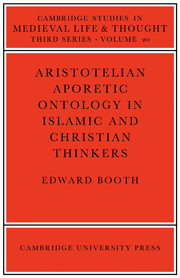Book contents
- Frontmatter
- Contents
- Preface
- Abbreviations
- 1 ARISTOTLE'S APORETIC ONTOLOGY AND THE RADICAL ARISTOTELIAN TRADITION
- 2 THE NEOPLATONIST INTERPRETATION OF ARISTOTLE'S ONTOLOGY
- 3 THE CHRISTIAN ARISTOTELIAN REACTION OF THE SIXTH CENTURY AND MONOTHEIST MODIFICATIONS TO THE NEOPLATONIST LEGACY
- 4 THE ARAB PERIPATETICS: AL-FĀRĀBĪ, IBN SĪNĀ AND IBN RUSHD; AND THE JEWISH PERIPATETICS: ABRAHAM BEN DAVID AND MOSES MAIMONIDES
- STASIMON: THE INTRODUCTION OF THE ‘NEW’ ARISTOTLE AND THE ARAB PERIPATETICS TO MEDIEVAL CHRISTENDOM
- Conclusion
- Appendix
- Bibliography
- Index
STASIMON: THE INTRODUCTION OF THE ‘NEW’ ARISTOTLE AND THE ARAB PERIPATETICS TO MEDIEVAL CHRISTENDOM
Published online by Cambridge University Press: 05 November 2011
- Frontmatter
- Contents
- Preface
- Abbreviations
- 1 ARISTOTLE'S APORETIC ONTOLOGY AND THE RADICAL ARISTOTELIAN TRADITION
- 2 THE NEOPLATONIST INTERPRETATION OF ARISTOTLE'S ONTOLOGY
- 3 THE CHRISTIAN ARISTOTELIAN REACTION OF THE SIXTH CENTURY AND MONOTHEIST MODIFICATIONS TO THE NEOPLATONIST LEGACY
- 4 THE ARAB PERIPATETICS: AL-FĀRĀBĪ, IBN SĪNĀ AND IBN RUSHD; AND THE JEWISH PERIPATETICS: ABRAHAM BEN DAVID AND MOSES MAIMONIDES
- STASIMON: THE INTRODUCTION OF THE ‘NEW’ ARISTOTLE AND THE ARAB PERIPATETICS TO MEDIEVAL CHRISTENDOM
- Conclusion
- Appendix
- Bibliography
- Index
Summary
Homogeneous in spirit, for it was enthusiastically Christian, the quality of the thought of the intellectuals of Western Europe contemporary with the principle Arab falāsifah was not always coincident and systematic in detail. The two religiously based civilisations could understand each other in their own terms. Their common basis in Jewish monotheism and their common acceptance of the Jewish scriptures, as well as Islam's acceptance of some Christian data, created a cultural relationship between them. In terms of the standing of their learning, the falāsifah had an immense disadvantage in that they were often under great suspicion from the religious leaders and political rulers. But in Christendom, the intellectuals were almost without exception clerics, and usually monks or canons; and they had been integrated into the feudal political hierarchy. Disputes between them and the political leaders were over the additional political privileges expected by the Church. Whilst the prominent Arabs who became known to the West were mainly Aristotelians of a small, closely-related group, the wide Christian culture had for centuries taken for granted, in the works of Augustine (354–430) and the translations of Eriugena, the facilities which Platonist and Neoplatonist conceptions gave to the expression of inherited dogmas and to the contemplative search for God.
Augustine's thought was not so much a system of ideas as a cluster of articulate conceptions, deriving from a unity of inspiration, bearing on all aspects of life: perennially capable of setting on fire a spirit attuned to itself.
- Type
- Chapter
- Information
- Aristotelian Aporetic Ontology in Islamic and Christian Thinkers , pp. 156 - 162Publisher: Cambridge University PressPrint publication year: 1983

